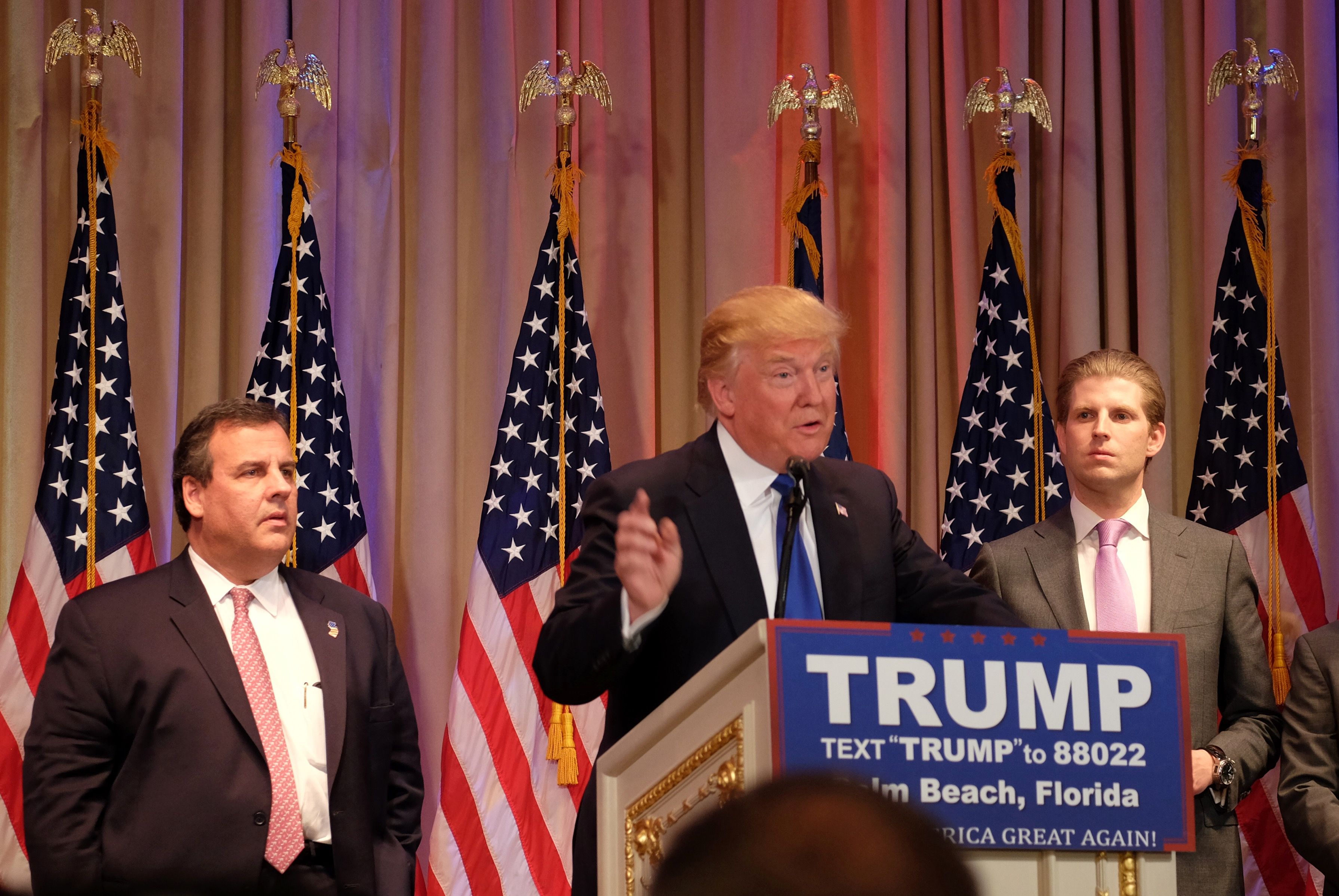
As Donald Trump continues his march toward the Republican presidential nomination, panic is spreading among Republicans over how and whether they can stop the New York billionaire.
Trump won at least six of the 11 Republican contests on Tuesday, from New England to a convincing sweep of the Southeast. He probably racked up more delegates than all his opponents combined. It wasn't a clean sweep. Senator Ted Cruz handily won his home state of Texas, the biggest delegate prize of March 1, and upset Trump in Oklahoma. Senator Marco Rubio won his first contest of the campaign, in Minnesota, where Cruz also beat Trump. Cruz's victories and Rubio's mediocre showing overall sustains the divided opposition to Trump for at least a few more weeks.
Rubio now needs a victory in his home state of Florida in the primary there on March 15. Similarly, Governor John Kasich of Ohio, who finished out of the money everywhere but New England, needs to beat Trump in his home-state primary on the same day.
On the Democratic side, it was another big night for Hillary Clinton. She continued to run away from Senator Bernie Sanders by dominating the South with huge margins among African-American voters. She also won a hotly competitive race in Massachusetts. Sanders easily captured his home state of Vermont and beat Clinton in Oklahoma, Minnesota and Colorado.
Clinton remains a prohibitive favourite to win the nomination, yet the Vermont socialist did well enough to credibly continue his challenge. He hopes to frame a big showdown with the former secretary of state on March 8 in Michigan, where he will make opposition to free-trade deals a central issue.
Much of the Republican party, which has been in denial for months about a Trump nomination, now is engaged in meetings, strategy sessions and debates over what to do about the prospect. It is quickly developing into the most divisive intraparty fight in modern times, worse than the 1964 struggle between Barry Goldwater and Nelson Rockefeller or the 1976 contest between president Gerald Ford and Ronald Reagan.
Trump and his supporters believe they are tapping into the righteous anger of a frustrated electorate, only to be rebuffed by a privileged establishment defending its own interests. If his quest for the Republican nomination is foiled, Trump seems ready to attempt a party-shattering independent candidacy.
Many Republican office holders and policy experts believe Trump would be an electoral disaster for Republicans. Polls show him running behind Hillary Clinton and taking down a lot of Republican officeholders with him as he taints the party's already troubled image with his anti-immigration and racially incendiary postures.
There's disagreement about how to respond, with party factions flailing at one another. Some believe he still can be denied the 1,237 delegates necessary to win the nomination at the Republican convention in Cleveland this summer. That would be feasible only if Rubio and Kasich win the winner-take-all contests in their home states in two weeks.
Even then, Trump probably would have a clear lead in the delegate count, and the opposition would have trouble rallying behind one alternative. The reality is that the party establishment will have little influence on the convention without manipulating rules in a way that would assure a rupture.
There are intense behind-the-scenes efforts to rally opposition. One outside effort has begun, funded by the family of Marlene Ricketts, owner of the Chicago Cubs and a big Republican donors. It includes anti-Trump ads in Florida and Ohio and is being assisted by a former top aide to Jeb Bush. One catalysing moment was Trump's jumbled refusal last weekend to disavow David Duke, a leader of the Ku Klux Klan.
Another party faction argues that the Trump nomination is inevitable, and that to protect other Republicans, especially vulnerable senators, an independent candidacy led by a conservative should be waged. Senator Ben Sasse of Nebraska is promoting this approach.
It would be hard to carry out, starting with an uphill effort to get on ballots in big states like Texas, North Carolina and Illinois. So far there is no credible standard bearer.
Some Republicans have said they wouldn't support Trump. On the other side, House Majority Leader Kevin McCarthy advocates trying to work with the maverick billionaire, calculating that he would become more flexible than he appears once in the White House.
Sanders is unlikely to succumb to Democratic pressure to bow out. He is winning delegates and has created an effective money machine of 1.5 million small donors. His campaign believes he can do well in some upcoming small-state caucuses, and he relishes the Michigan primary showdown next Tuesday. Free trade is unpopular there, and Sanders has been a longtime opponent of trade deals while secretary Clinton is a recent convert to the cause.
Some Clinton strategists believe it won't be possible to address her weakness with younger voters until the Sanders challenge dissipates.
An FBI inquiry into her private e-mail account potentially could derail her quest. Even if her use of a private server instead of a government one survives legal scrutiny, she could be damaged politically if any aides are found culpable.
Either way, the e-mail controversy has taken a toll on Clinton's reputation for trustworthiness. In recent polls she has the second highest unfavourable ratings of any major national political figure. The worst is Donald Trump. - Bloomberg View